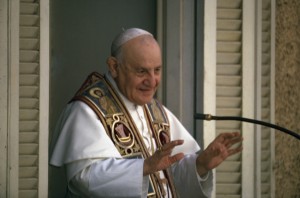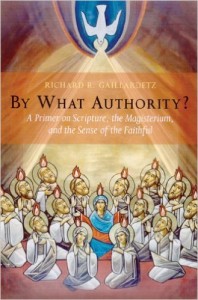 It is said of Pope John XXXIII who ushered in the Second Vatican Council (1962-1965) that he said the following to a group of seminarians: “I am not infallible. The pope is only infallible when he speaks ex cathedra (from the chair of Peter). I will never speak ex cathedra, therefore I am not infallible.” The seminarians were shocked, because they had a limited understanding of what infallibility meant. I suspect many Catholics today have a limited understanding of this concept. The teaching about infallibility was defined at Vatican Council I in the 1800s in the midst of challenges to papal authority and further elaborated during Vatican Council II. Let me say that there have been only two infallible pronouncements in the last 162 years: Pope Pius IX in 1854 proclaiming the Immaculate Conception (Mary conceived without sin), and Pope Pius XII in 1950 proclaiming the Assumption (Mary’s ascent to heaven).
It is said of Pope John XXXIII who ushered in the Second Vatican Council (1962-1965) that he said the following to a group of seminarians: “I am not infallible. The pope is only infallible when he speaks ex cathedra (from the chair of Peter). I will never speak ex cathedra, therefore I am not infallible.” The seminarians were shocked, because they had a limited understanding of what infallibility meant. I suspect many Catholics today have a limited understanding of this concept. The teaching about infallibility was defined at Vatican Council I in the 1800s in the midst of challenges to papal authority and further elaborated during Vatican Council II. Let me say that there have been only two infallible pronouncements in the last 162 years: Pope Pius IX in 1854 proclaiming the Immaculate Conception (Mary conceived without sin), and Pope Pius XII in 1950 proclaiming the Assumption (Mary’s ascent to heaven).
There are different levels of Church teaching depending on where it is coming from. When it comes from the Magisterium, we have the following levels:
- Ordinary Magisterium. This includes the Individual Bishop, Groupings of Bishops, or the Bishop of Rome (the pope). Teaching at this level is NON-INFALLIBLE.
- Extraordinary Magisterium. This includes the College of Bishops Issuing a Solemn Definition While gathered in an Ecumenical Council. Such teaching would be INFALLIBLE. A second way for this to be exercised would be The Bishop of Rome (as Head of the College of Bishops) Issuing a Solemn Definition EX CATHEDRA, which would also be INFALLIBLE.
- Ordinary Universal Magisterium. This involves the Whole College of Bishops Dispersed throughout the World When United in Judgment that a Teaching is to Be Held as Definitive. This also would be INFALLIBLE.
Any teaching of the Magisterium is important and should be taken into consideration. Some areas in which an individual bishop, group of bishops or the bishop of Rome might be expected to teach would be immigration, the death penalty, or guidelines for voting one’s conscience. While not infallible, it is important to take these into consideration if one is trying to grow spiritually. Pope’s put out various forms of teachings, such as Pope Francis’ “Laudato Si” on care for the earth as our common home, and his recent “Amoris Laetitia” (The Joy of Love). These also need to be given careful attention and reflection . There are teachings that have not been formally “defined” but have been held since the earliest days of the Church, and these certainly are infallible. Some examples, the Resurrection of Jesus, the presence of the Holy Spirit guiding the Church, etc.
Anyone wanting to delve more in depth into this complex area would do well to read “By What Authority?” By Richard R. Gaillardetz!
Amazon Link to “By What Authority?” By Richard R. Gaillardetz!

